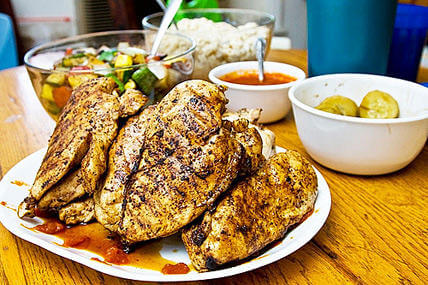My new extreme sport is exposing strangers, through Dinner with the Smileys, to the sometimes-charm, sometimes-wrath of my pre-adolescent son. Quite frankly, on most days, I'd much rather eat a South American hissing cockroach or parachute out of a helicopter.
My youngest son, Lindell, is considered adorable in all situations. Yes, even when he's mooning a former governor or pretending to vomit a plastic earthworm. But Lindell is 5. Society makes a lot of exceptions for the kindergarten crowd.
Owen, by virtue of his position as the middle child, only dreams of mooning important people or having any sort of wrath to call his own. He's just lucky we don't accidentally leave the house for school without him, when he's quietly in his room, tying his shoes or otherwise minding his own business.
But Ford -- well, Ford is in a tough spot. Not only is he the oldest, and not only do I (right or wrong) expect the most out of him, but he's gone through this roller-coaster, pre-teen year alongside the 315 different people we've had to dinner once a week. All because Ford's dad -- his idol, his mentor, the man who can do no wrong -- has been deployed overseas for 12 months. Ford has been left with me: the mom who can't throw a football, who pushes snooze 15 times, and who asks him to do annoying things like take dirty plates to the sink after dinner.
So it's been a rough year for me and Ford. Or maybe it just seems that way because we've had a weekly "audience" at the dinner table. Most boys and their parents suffer the pre-teen years with grace and dignity in the privacy of their own homes. Ours has been on display. I've joked that we are a cautionary tale: adult-repellent at our worst; real, live birth control at our best.
Sometimes, I've wondered if Dinner with the Smileys has been too much for Ford, who, like his dad, finds social situations difficult. Each week, I've forced Ford out of his comfort zone, and many times, I've paid the price. We've had dinner with a wide range of people, from those who are extroverted and funny, to those who are quiet and serious, and even someone who suffers from Alzheimer's disease. I've pushed my boys' limits with dinners like #35, which included rock climbing a cliff at Acadia National Park.
Often Ford, Owen and Lindell have welcomed the challenge. More often, however, Ford in particular has resisted and rebelled. But for all Ford's reservation and inhibition, he hasn't been shy about letting our guests know how he's feeling. He's sighed, rolled his eyes, shut down and acted like I'm the stupidest person who ever put on pants.
To be fair, it isn't always Ford. Lindell and Owen have had their moments, too (Please see paragraph two about Lindell mooning a governor). It's like a perpetual game of Whack-a-Mole. As soon as one son is content and behaving, another one pops up. This is the way nature intended, because mothers would not survive if all the "moles" popped up at once.
I've made apologies for my boys after many of the dinners. Like a public affairs person cleaning up a politician's mess, I try to put the boys' comments and behaviors into context. I ask our new friends to understand, or even, to remember their own children's worst moments.
Oh, but watch: Readers will say, "Those poor children," and "Look at what she's made them go through." People will assume it might have been better if I had just let them get through these prickly years in peace and isolation.
After 47 weekly dinners with our community, however, I completely disagree. What I've given my boys is a year full of lessons, each with a steep learning curve and usually no study guide. The boys have had to learn to be tolerant, patient, flexible and accommodating. They've learned to read social cues, give and take, and, ultimately, to say "sorry" when appropriate.
Yes, most people are spared the embarrassment of having a "moment" in front of strangers at the dinner table, but those people have also missed the opportunity to learn and grow with their community.
At our latest dinner, after Ford left the table angry, I overheard our female guest whisper to her husband, "Why don't you go check on Ford." The husband did. And, like magic to a weary mother, 10 minutes later, Ford was back at the table -- grudgingly, but there nonetheless.
It's true that Ford might resent me now. Maybe he's angry about all I've asked him to do. Maybe I've made him feel uncomfortable. But I have faith that once these rocky years have passed, he will look back and recognize my gift to him: one year filled with a village that, in the absence of his father, helped to raise him.





















